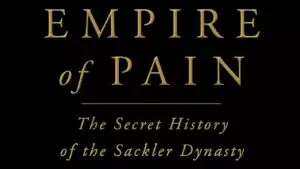By Andrew Wheelhouse

✅ AI Essay Writer ✅ AI Detector ✅ Plagchecker ✅ Paraphraser
✅ Summarizer ✅ Citation Generator
‘We think we know what’s coming. But is it already too late?’ Taglines this ominous in tone usually belong to a Roland Emmerich disaster film, with Big Ben, or the White House being devoured by a giant alien crab, or a slasher film with nubile hotties being butchered by a chap wearing his pants on his head and two pencils up his nose.
Not in this case. The above quotation actually appears on the reverse of How The West Was Lost? by Dambisa Moyo, an exposition of, ‘fifty years of (Western) economic folly—and the stark choices ahead’. For the relatively economically illiterate (including this reviewer), Moyo’s conclusions will sound alarmingly like end-of-days material. On their present trajectory, the Western economies are sleepwalking towards the abyss, saddled with huge debts and lumbered with colossally expensive social security programs that will only increase in cost as our greying populations age. We will be replaced, according to Moyo, by ‘The Rest’, led by an economically resurgent China, who couldn’t give a toss for the free-market financial framework that the West broadly adopted following the Second World War. Instead, awash with cash, they will buy up our prize assets and brush aside competition from Western economies with their anaemic growth rates in order to become the world’s foremost economic powers.
Moyo is in no way mealy-mouthed about any of this. The West must radically adapt itself to the challenges it faces, or be relegated to the pile of economic has-beens. She recalls an illustrative anecdote from a business conference, where a Western telecoms executive is boasting about his company’s capabilities and accomplishments, their ‘range and depth and brilliance’. After enthusiastic applause, his Chinese opposite number stands up and says ‘We can do everything he can…for 40 percent less’. He promptly sits down. Such stories certainly inspire trepidation in Western minds and allude to the Chinese business strategy of ‘volume-maximisation’ (sell as much as possible by minimising prices to under-cut the competition) as opposed to Western ‘profit-maximisation.’ But what is the root cause for the shrinking of the West’s economic lead? Moyo’s answer, while somewhat conventional, does deserve a brief treatment.
According to current economic theory, the path to economic dominance can be boiled down to a triad of ingredients: capital, labour, and technology, all of which need to be correctly allocated in order to ensure economic success. The squandering of Western capital, to cut a long story short, arose from the growth of a culture of debt among private citizens and financial institutions alike, encouraged by government subsidies and guarantees and the good old-fashioned irrational belief that asset prices could only rise. Asset bubbles thus grew around seemingly lucrative but ultimately unproductive sectors that add no wider value to the economy. The Irish economy pre-2008 was a good example of this foolishness where areas such as the construction industry boomed whilst vital national infrastructure such as roads fell into disrepair. The problem with the property sector, as Moyo points out, is that once you live in a house, there is no cash flow, the benefit being one of lifestyle or a ‘convenience yield’ in economic jargon. Put simply, the economy would be better off if people rented their accommodation and invested their remaining cash in things that generated a monetary return.
Here the author’s message chimes neatly with Niall Ferguson’s expose of that peculiarly Anglophone notion of ‘the property owning democracy’ in The Ascent of Money. Although politically and socially attractive, this notion ignores the fact that home-buying essentially amounts to a massive, unhedged bet on a single asset class, literally betting the house that property prices will not fall.
Moyo is also highly critical of pension schemes, both state and private, throughout the industrialised world, which are generating huge debt obligations that will smother economic growth in the coming years as our populations age. Equally alarmingly, the manufacturing sector which cemented the West’s economic lead during the Industrial Revolution has been left to whither in favour of a ‘post-industrial’ ie, service-based economy. Tighter immigration controls prevent the West from importing the foreign talent that could drive society forward, while domestic education systems struggle to produce sufficiently competent young people to add to the work force.
Moyo also believes that the West is not protecting its hard won intellectual property, either allowing it to be appropriated by others or simply giving it away. For instance, pharmaceuticals are often handed out in the developing world at a fraction of the price it cost to develop them. Meanwhile, capital required for vital work in R&D is either being reduced in tough economic times, or once more, misallocated towards projects that do not have a broad societal value (such as computer software for the hyper-fast trading of shares on the stock market.)
The value of the author’s potted economic history derives from the fact that Moyo weaves together a very expansive account of where the West went wrong from a kaleidoscope of socio-economic factors. It makes for fluid and fascinating reading. What is of greater interest, however, is what she proposes for stopping the rot. Aside from overhauling the tax system to encourage saving rather than consumption, and a reallocation of the ingredients of economic growth, Moyo believes that aggressive protectionism and a default on the US national debt are the best options available. Her reckoning is that protectionism would force a rebalancing of Western economies in favour of domestic employers and at the expense of foreign ones. Similarly, she wagers that as America’s largest creditor, China would have no choice, but to concede to a debt rescheduling favourable to the US:
‘If it came to it, American politicians could successfully advocate the merits of a closed-in America. Not so China. How would its leadership explain to the hundreds of millions of aspiring Chinese…that their chances of economic success would have to be managed substantially downwards?’
According to Moyo they wouldn’t or couldn’t. America would win favourable terms, in all likelihood the ‘financial markets would be willing to lend to the US again within six months’ and Western autarky would hopefully strangle Chinese prosperity as their exports plummet. Job done. Well, unless you happen to live in Europe, or more precisely the Eurozone, which Moyo deems to be fatally lumbered with ‘the PIGS’ (Portugal, Ireland, Greece and Spain.)
How The West Was Lost is, at less than 200 pages, a short book, so it would be unjust to try and nitpick at the details. But the broader themes of the book do deserve criticism.
One would think, listening to Moyo, that everyone in the West has been asleep whilst China set about conquering the universe. But it is important to note, as Sean O’Grady has in the Independent, that in some ways, How The West Was Lost is merely an incremental addition to a tranche of popular books on economics whose contents can roughly be summarised as ‘China Will Eat Us.’ Unlike Moyo’s last book, ‘Dead Aid’ which savaged Western developmental policies in Africa, How the West Was Lost is, in truth, more conventional in its proposals than the author would like to believe. Moyo certainly has a lot of faith in the way the Chinese go about their business, which she ascribes to a lack of democratic institutions. Not having to listen to, or be accountable to the people, allows them to take the long view and to make tough but necessary decisions. It feels like something of a non-sequitur. Societies that don’t have to listen to their people will not necessarily make the right decisions. As Moyo notes, China’s rulers are looking at implementing exactly the sort of expensive pension fund system that has proved so burdensome to the West.
Why would they be doing this? It is probably because the one child policy, dating from when China was more concerned about the possibility of famine than global domination, means that the country is facing the same demographic cataclysm as Western nations. Basic mathematics would indicate that without pension coverage, each husband and wife would have to not only provide for their child, but all of their surviving parents and grandparents. It is indicative of the fact that China is beset by many of the same problems as the West, problems that its bureaucracy will not find easier to solve for their unaccountability.
Furthermore, one has to question whether or not Moyo is correct to characterise the Chinese worker as some sort of productive ‘ubermensch.’ Recent reportage has shown how, with the rise of a new Chinese middle class, has come the rise of the ‘little emperors,’ only children in the new urban China who enjoy the unlimited attention of parents and grandparents. It is unknown yet whether these citizens will lead China to economic dominance, or if they will frustrate the productivity forecasts by proving as clueless and work-shy as some of their Western counterparts.
How The West Was Lost is rife with unfounded assumptions. Key among them is the notion that someone has to be screwed over. It is full of the discourse of winners and losers, victors and vanquished, races to be won, opponents to be outmanoeuvred, markets to be cornered. The author would no doubt consider this to be simple realism, premised upon a world with finite resources (how depressing), but one has to ask, does the world really need another book which implores nations to better impoverish one another?
———–
Written under a Creative Commons License, with edits: https://creativecommons.org/licenses/by/1.0/
Follow us on Reddit for more insights and updates.





Comments (0)
Welcome to A*Help comments!
We’re all about debate and discussion at A*Help.
We value the diverse opinions of users, so you may find points of view that you don’t agree with. And that’s cool. However, there are certain things we’re not OK with: attempts to manipulate our data in any way, for example, or the posting of discriminative, offensive, hateful, or disparaging material.